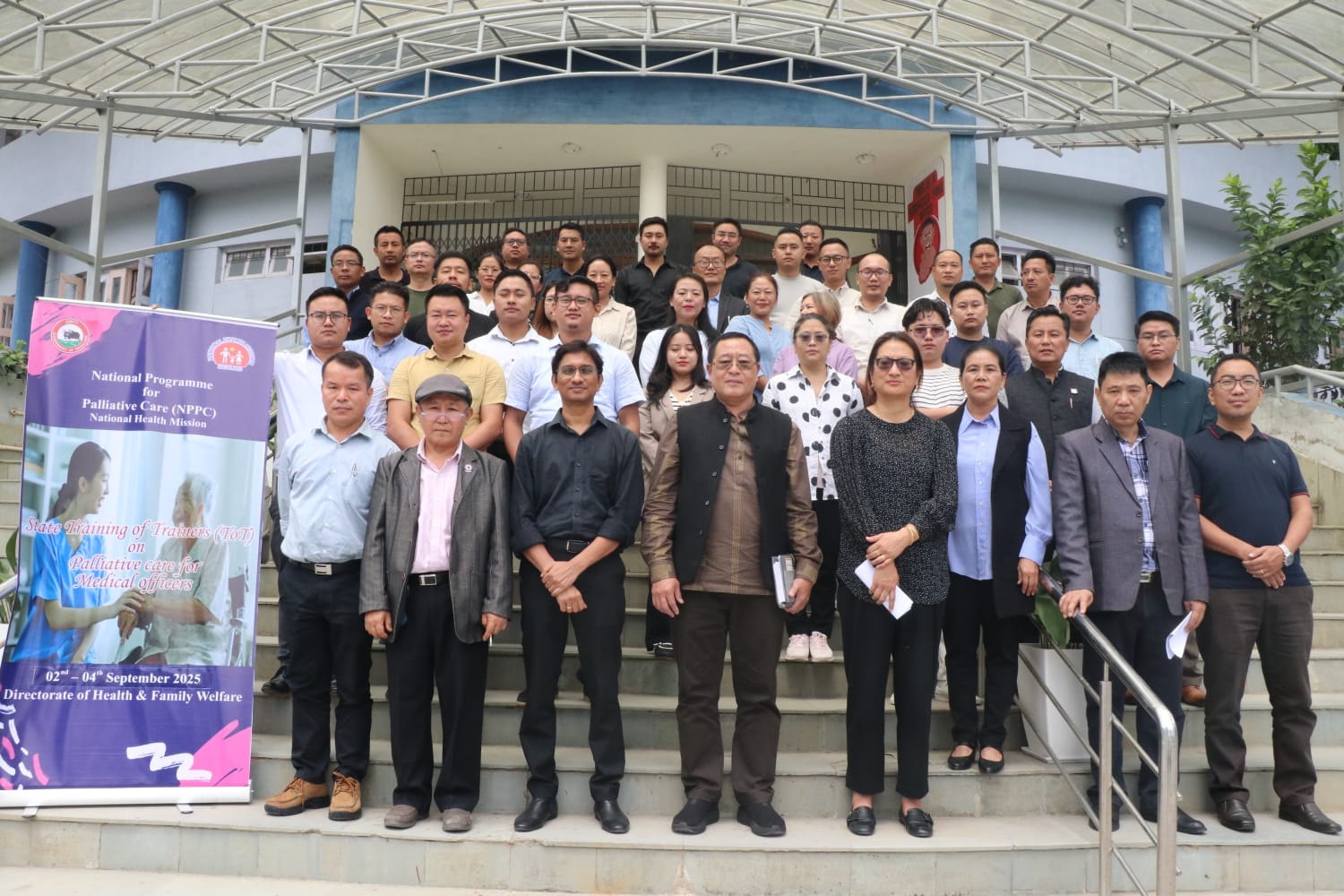WEDNESDAY, SEPTEMBER 03, 2025
- Home
- Training on palliative care for medical officers underway in Kohima
Training on palliative care for medical officers underway in Kohima
Three-day training on palliative care for medical officers get underway in Kohima.
Published on Sep 2, 2025
By EMN
Share

DIMAPUR — A three-day training of trainers in palliative care for medical officers, organised by the department of Health and Family Welfare under the National Programme for Palliative Care (NPPC), got underway on Tuesday at its directorate in Kohima.
An update from the department stated that Dr. Chikrozho Kezo, joint director and SPO of NPPC, encouraged all the district representatives to actively participate in the training and work towards strengthening the implementation of palliative care services under NPPC.
In her keynote address, the principal director of Health and Family Welfare, Dr. Mereninla Senlem, emphasised the need for palliative care as a result of increase in number of the elderly population and the rising burden of non-communicable diseases and some communicable diseases.
Also read: Tikvah Healthcare Pvt. Ltd. makes transformative impact on health sector
It mentioned that palliative care improves the quality of life of patients and that of their families, who are facing challenges associated with life-threatening illness whether physical, psychological, social or spiritual. It added that only 14% of those in need, currently, receive palliative care.
It stated that NPPC is a comprehensive effort to integrate palliative care into the Indian healthcare system, making it more accessible and community-focused. It pointed out that over 80% of palliative care needs could be managed at home with the right training and support systems in place.
It also stated that many patients with cancer, end-stage organ failure, neurodegenerative diseases and geriatric conditions prefer to receive care in their homes, surrounded by their families. It pointed out that hospital-based palliative care is resource-intensive, whereas home-based care is cost-effective and enhances quality of life by reducing unnecessary hospitalisation.
It, therefore, pointed out that there was a need to prioritise implementation of NPPC, providing palliative care services in all the districts by emphasising on the importance of pain and symptom management as well as the role of interdisciplinary teams in providing holistic care.
Read more: SNA-Sparsh training for government departments held in Kohima
Also speaking at the inaugural programme, Dr. Keveduyi Theyo, NHM state programme officer, highlighted that NPPC was launched in 2012, which is now a part of the National Health Mission (NHM). He informed that palliative care programme in Nagaland was initiated during 2017 and envisaged to strengthen infrastructure, capacity building, drug availability and awareness generation.
He stated that capacity building is the backbone of a strong palliative care system adding that without a well-trained workforce, quality service delivery would not be achieved.
According to him, strengthening palliative care services at HWCs, PHCs and CHCs are vital to provide care closer to patients' homes and added that caregivers (family members, ASHAs, ANMs, community health workers and trained volunteers) serve as the primary link between patients and healthcare professionals.
“Structured training programmes for caregivers in palliative care, engaging religious institutions, social groups and civil society can create sustainable community based palliative care approach. As a way forward, districts must prioritise capacity building and engage in service delivery and conduct trainings at the district level to further build the capacity of healthcare providers under NPPC,” Dr. Theyo said.
Dr. Obangjungla, IAPC executive member and representative Northeast India, also spoke on the occasion.
The resource persons of the three-day training included Dr. Kikato Chishi, Oncology department at NHAK Kohima; Dr. Nepuni Athikho, consultant of family medicine and geriatric health at Eden Hospital; Dr. Tony Vikas Bishwas, consultant of palliative medicine at CIHSR; and Ethungbemo Ezung, drug control officer at DHFW.
Meanwhile, the Directorate of Health and Family Welfare launched a creche (child play room) at erstwhile NHP with Dr. Akuo Sorhie, retired NHM mission director, and Dr. Vezokholu, retired director of DHFW, as special guests.
Speaking at the programme, the principal director of Health and Family Welfare, Dr. Mereninla Senlem, stated that the project to initiate and launch the creche (child play room) has been a long-time plan for the benefit of its staff.
Dr. Avile Zao, NHM mission director, chaired the programme and Dr. Vezokholu Theyo said the benediction.

